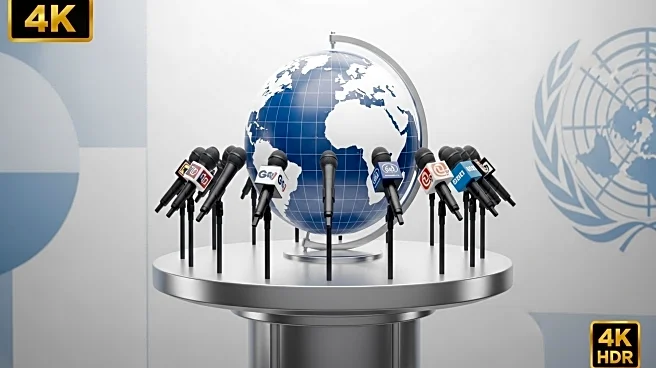What's Happening?
World leaders are gathering at the United Nations during a period marked by significant global challenges, including ongoing conflicts in Gaza and Ukraine, and shifts in U.S. foreign policy. Secretary-General Antonio Guterres highlighted the strain on international cooperation, emphasizing the urgency of addressing issues such as climate change, technological advancements, and global inequalities. The assembly will see discussions on Palestinian statehood, with France and other nations recognizing Palestine, defying U.S. and Israeli positions. The meeting aims to foster dialogue and solutions to pressing global issues, with leaders urged to bridge divides and make tangible progress.
Why It's Important?
The U.N. assembly is a critical platform for addressing global issues that affect international peace and security. The recognition of Palestinian statehood by several countries signifies a shift in diplomatic stances, potentially impacting Middle East peace efforts. The assembly's focus on climate change, technological regulation, and poverty highlights the interconnected nature of global challenges. The gathering provides an opportunity for leaders to collaborate on solutions, but the polarized geopolitical landscape poses challenges to achieving consensus. The outcomes of these discussions could influence international relations and policy decisions, affecting millions worldwide.
What's Next?
The U.N. assembly will continue with high-level discussions on various global issues, including the Israeli-Palestinian conflict, climate change, and technological regulation. The recognition of Palestinian statehood may lead to further diplomatic developments and discussions on a two-state solution. The assembly will also address funding and reform needs for the U.N., with Secretary-General Guterres advocating for changes to enhance the organization's responsiveness. The meeting's outcomes will be closely watched for potential shifts in international policies and alliances, impacting future diplomatic and security strategies.
Beyond the Headlines
The U.N. assembly's discussions on Palestinian statehood and other contentious issues reflect deeper geopolitical tensions and the challenges of achieving international consensus. The recognition of Palestine by several countries highlights the complexities of Middle East diplomacy and the potential for shifts in regional alliances. The assembly's focus on climate change and technological regulation underscores the need for global cooperation in addressing long-term challenges that transcend national borders. The meeting serves as a reminder of the U.N.'s role in facilitating dialogue and fostering solutions, despite the difficulties posed by a polarized world.









